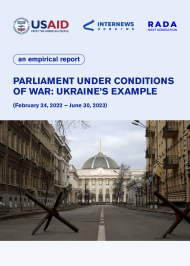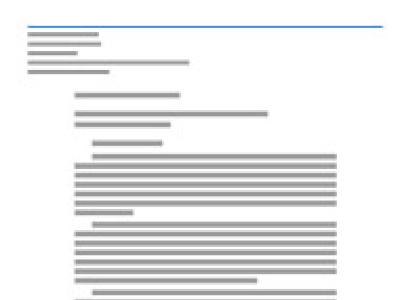
The work of the Parliament under conditions of war is quite a difficult task from the organizational, constitutional and legal points of view. The collegial nature of the legislative body's work and the nature of the body’s parliamentary procedures require special efforts to organize its work in such extraordinary circumstances as war. In view of this, constitutional regulation in many countries provides for partial delegation of legislative drafting functions from the Parliament to other bodies of power. Ukrainian legislation provides no exceptions or opportunities for the delegation of legislative powers.
According to the Constitution of Ukraine, the Verkhovna Rada of Ukraine can and must work even under martial law. The point is that Ukraine belongs to the continental legal system, where the weight of normative regulation by parliamentary acts (laws) is extremely high. Article 92 of the Constitution of Ukraine provides for a large number of spheres (issues) the regulation of which is allowed only through the adoption of Laws by the Parliament. Therefore, the absence of a functioning Parliament even under conditions of war would lead to significant difficulties for the entire national legal system.
The Verkhovna Rada of Ukraine continued to exercise its constitutional powers even under conditions of the full-scale invasion.
This report presents empirical data on the work of the Verkhovna Rada of Ukraine in the period from February 2022 to June 2023 (some statistical indicators are displayed as of April or May 2023). The authors focused specifically on the legislative function, because it was the main activity of the Parliament during the analyzed time period. To form the research methodology and collect information, the experts conducted a series of interviews with the leadership of the Verkhovna Rada of Ukraine and certain parliamentary Committees as well as with employees of the Secretariat of the Verkhovna Rada of Ukraine. The conducted interviews made it possible to more precisely verify the research hypotheses and priorities for collecting and presenting information.
Information for the Report was collected from open sources of information, primarily from the official web portal of the Verkhovna Rada of Ukraine, websites of the secretariats of the parliamentary Committees and web resources of certain other bodies of state power. The level of transparency and openness of the work of the Ukrainian Parliament has somewhat decreased in the conditions of the full-scale war, but the volume of available information is extremely large anyway and interesting for analysis.
Given the circumstances of the terrible full-scale war, the authors deliberately avoided using any information other than that which was placed by the authorities and their units for public access on the Internet. As a result, some substantive aspects and statistical data from the work of the Verkhovna Rada of Ukraine are not presented in the Report. However, the collected information makes it possible to see certain trends and specifics of the implementation of the Parliament’s legislative function under conditions of war.
The core task of this study is to present the main facts and quantitative indicators of the work of the Verkhovna Rada of Ukraine. In view of the above, the authors of this Report also deliberately avoided making clear and unambiguous conclusions regarding the revealed facts and specifics of the legislative process in the conditions of the full-scale war. These materials can and must receive further verification through official data and can become the basis for a more thorough analysis within the Parliament. Also, we hope it will become the foundation for further scientific research in this area, including in a comparative aspect.
The research was conducted be a group of experts of the USAID Program “RADA: Next Generation.” The collection of data and the preparation of the report based on the results of the research were coordinated by Volodymyr Venger. Directly involved in the research activities were Volodymyr Venger, Maksym Bondar, Bohdana Doroshenko, Yulia Kyrychenko and Stanislav Ivasyk.
The research is made possible by the generous support of the American people through the United States Agency for International Development (USAID). The contents do not necessarily reflect the views of USAID or the United States Government. The materials were published within the USAID RADA: Next Generation Program, which is a five-year initiative (2021-2026) implemented by the NGO "Internews-Ukraine".
DOWNLOAD REPORT (IN ENGLISH, UKRAINIAN) HERE





